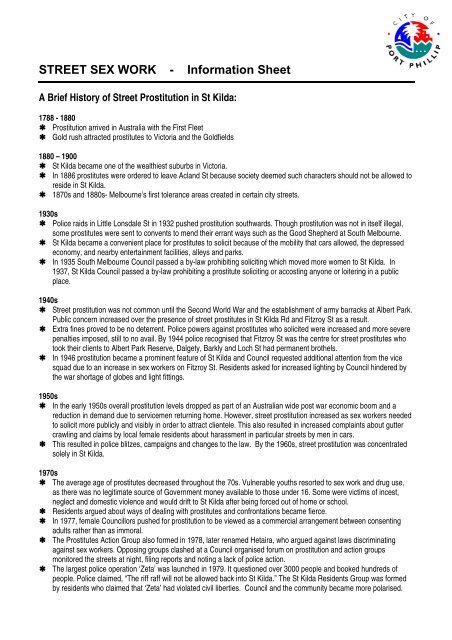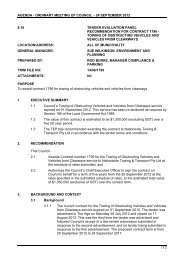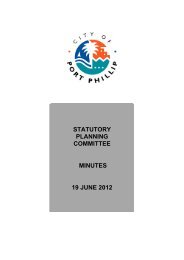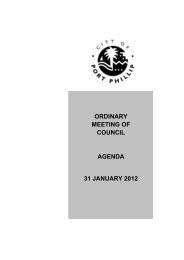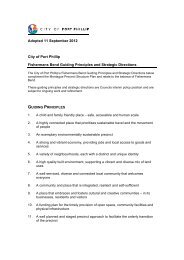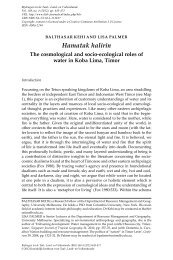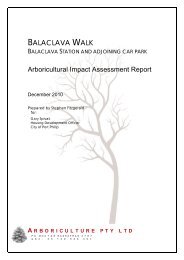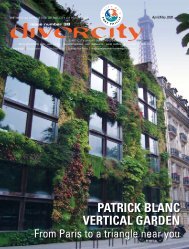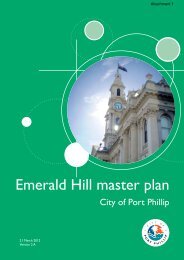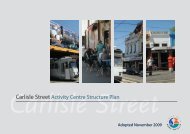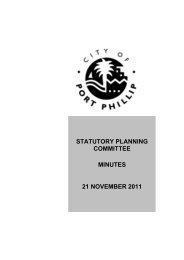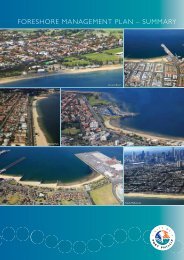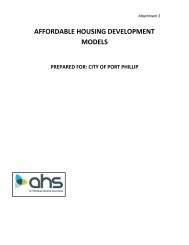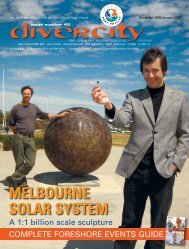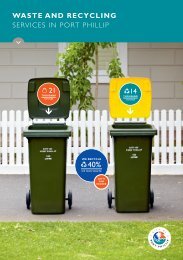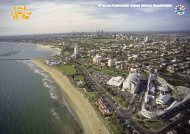STREET SEX WORK - Information Sheet - City of Port Phillip
STREET SEX WORK - Information Sheet - City of Port Phillip
STREET SEX WORK - Information Sheet - City of Port Phillip
You also want an ePaper? Increase the reach of your titles
YUMPU automatically turns print PDFs into web optimized ePapers that Google loves.
<strong>STREET</strong> <strong>SEX</strong> <strong>WORK</strong> - <strong>Information</strong> <strong>Sheet</strong><br />
A Brief History <strong>of</strong> Street Prostitution in St Kilda:<br />
1788 - 1880<br />
Prostitution arrived in Australia with the First Fleet<br />
Gold rush attracted prostitutes to Victoria and the Goldfields<br />
1880 – 1900<br />
St Kilda became one <strong>of</strong> the wealthiest suburbs in Victoria.<br />
In 1886 prostitutes were ordered to leave Acland St because society deemed such characters should not be allowed to<br />
reside in St Kilda.<br />
1870s and 1880s- Melbourne’s first tolerance areas created in certain city streets.<br />
1930s<br />
Police raids in Little Lonsdale St in 1932 pushed prostitution southwards. Though prostitution was not in itself illegal,<br />
some prostitutes were sent to convents to mend their errant ways such as the Good Shepherd at South Melbourne.<br />
St Kilda became a convenient place for prostitutes to solicit because <strong>of</strong> the mobility that cars allowed, the depressed<br />
economy, and nearby entertainment facilities, alleys and parks.<br />
In 1935 South Melbourne Council passed a by-law prohibiting soliciting which moved more women to St Kilda. In<br />
1937, St Kilda Council passed a by-law prohibiting a prostitute soliciting or accosting anyone or loitering in a public<br />
place.<br />
1940s<br />
Street prostitution was not common until the Second World War and the establishment <strong>of</strong> army barracks at Albert Park.<br />
Public concern increased over the presence <strong>of</strong> street prostitutes in St Kilda Rd and Fitzroy St as a result.<br />
Extra fines proved to be no deterrent. Police powers against prostitutes who solicited were increased and more severe<br />
penalties imposed, still to no avail. By 1944 police recognised that Fitzroy St was the centre for street prostitutes who<br />
took their clients to Albert Park Reserve, Dalgety, Barkly and Loch St had permanent brothels.<br />
In 1946 prostitution became a prominent feature <strong>of</strong> St Kilda and Council requested additional attention from the vice<br />
squad due to an increase in sex workers on Fitzroy St. Residents asked for increased lighting by Council hindered by<br />
the war shortage <strong>of</strong> globes and light fittings.<br />
1950s<br />
In the early 1950s overall prostitution levels dropped as part <strong>of</strong> an Australian wide post war economic boom and a<br />
reduction in demand due to servicemen returning home. However, street prostitution increased as sex workers needed<br />
to solicit more publicly and visibly in order to attract clientele. This also resulted in increased complaints about gutter<br />
crawling and claims by local female residents about harassment in particular streets by men in cars.<br />
This resulted in police blitzes, campaigns and changes to the law. By the 1960s, street prostitution was concentrated<br />
solely in St Kilda.<br />
1970s<br />
The average age <strong>of</strong> prostitutes decreased throughout the 70s. Vulnerable youths resorted to sex work and drug use,<br />
as there was no legitimate source <strong>of</strong> Government money available to those under 16. Some were victims <strong>of</strong> incest,<br />
neglect and domestic violence and would drift to St Kilda after being forced out <strong>of</strong> home or school.<br />
Residents argued about ways <strong>of</strong> dealing with prostitutes and confrontations became fierce.<br />
In 1977, female Councillors pushed for prostitution to be viewed as a commercial arrangement between consenting<br />
adults rather than as immoral.<br />
The Prostitutes Action Group also formed in 1978, later renamed Hetaira, who argued against laws discriminating<br />
against sex workers. Opposing groups clashed at a Council organised forum on prostitution and action groups<br />
monitored the streets at night, filing reports and noting a lack <strong>of</strong> police action.<br />
The largest police operation ‘Zeta’ was launched in 1979. It questioned over 3000 people and booked hundreds <strong>of</strong><br />
people. Police claimed, “The riff raff will not be allowed back into St Kilda.” The St Kilda Residents Group was formed<br />
by residents who claimed that ‘Zeta’ had violated civil liberties. Council and the community became more polarised.
1980s<br />
New town planning regulations and prosecutions on massage parlours drove more prostitutes onto the streets as sex<br />
workers in brothels did not get a sufficient percentage <strong>of</strong> customer payments and their earnings were also subject to<br />
taxation.<br />
The special Delta police taskforce concluded in 1983 that there were problems in St Kilda <strong>of</strong> child prostitution, child<br />
pornography, drug abuse and movement between Kings Cross and St Kilda <strong>of</strong> youths under 16 who were ineligible for<br />
unemployment benefits.<br />
Marcia Neave’s enquiry into prostitution in 1984 led to the Prostitution Control Act 1986 which warned against loitering<br />
in public space, but had no impact on street prostitution in St Kilda.<br />
1990s<br />
The 1994 Prostitution Control Act increased fines for street sex workers relating to <strong>of</strong>fences such as loitering and<br />
soliciting and new penalties and amended the 1986 Act by introducing charges for street sex workers working near<br />
churches, schools, kindergartens or anywhere where children frequent.<br />
In 1994 the Prostitutes Collective <strong>of</strong> Victoria held a rally in response to the murder <strong>of</strong> two street sex workers in St Kilda<br />
in 1994. They argued that violent men were given a clear message by our criminal justice system that attacking men<br />
and women in St Kilda was a lesser crime than attacking others. Over 150 sex workers, Councillors and residents<br />
marched, held candles, blew whistles and assembled at Talbot Reserve<br />
2000s<br />
In 2001 the <strong>Port</strong> <strong>Phillip</strong> Action Group (PPAG) marched to demand that something been done about street sex work in<br />
St Kilda. A group <strong>of</strong> 50 residents supporting street sex workers’ rights held a counter rally. It was called by QUEER,<br />
Queers United to Eradicate Economic Rationalism.<br />
State government set up a bipartisan investigation into street sex work through the Dept <strong>of</strong> Justice – the Attorney<br />
General’s Street Prostitution Advisory Group (AGSPAG). The group included residents, traders, police, local<br />
Councillors, MPs, reps from community and health agencies and one sex worker.<br />
The group recommended tolerance zones but Council had to draw up a list <strong>of</strong> possible sites using strict criteria and<br />
was forced to nominate some areas where sex work had not previously existed. Some residents rallied against these<br />
sites and PPAG claimed that there was nowhere suitable in St Kilda for street sex workers and reiterated their initial<br />
demand that all sex workers be moved out. Recommendations were released at a time coinciding with a State<br />
election. The Labour government withdrew their support and AGSPAG fell apart.<br />
A special court <strong>of</strong> the Melbourne Magistrates Court (‘Tuesday Courts’) was set up in October 2003 to hear cases<br />
against street sex workers as part <strong>of</strong> Inner South Community Health Services’ Arrest Referral Program. The program<br />
increased the numbers <strong>of</strong> street sex workers who attended court and supported their access to health and community<br />
services including drug treatment programs.<br />
Street Walking Blues was published in 2006, after interviews with 14 St Kilda street sex workers.<br />
Council initiated a series <strong>of</strong> innovative projects in the streets and alleys <strong>of</strong> St Kilda during 2004-2008 that educated<br />
more than 2000 community members about the complexities <strong>of</strong> street sex work and drugs.<br />
Council undertook a consultation process in direct response to the request <strong>of</strong> residents to have the opportunity to have<br />
their experiences and voices about living with street sex work heard. The 2010 report ‘Living Next to Street Sex Work’<br />
is a narrative <strong>of</strong> these stories. The process involved a letter-drop to 780 residences asking for an expression <strong>of</strong> interest<br />
to be involved in the consultation and, <strong>of</strong> these, 90 responses were returned to Council with 20 people selected to be<br />
interviewed by an independent researcher commissioned by <strong>City</strong> <strong>of</strong> <strong>Port</strong> <strong>Phillip</strong>.<br />
New laws have been introduced into Parliament to give Police the power to ban kerb-crawlers soliciting street sex<br />
workers and interfering with the liveability <strong>of</strong> the St Kilda community. These laws will operate on a trial basis and<br />
sunset on 1 January 2012 when they will be evaluated by Government. Evaluation <strong>of</strong> these laws will help to inform<br />
future law and order responses to street sex work. In the meantime, Council, Police and community agencies<br />
communicate regularly with each other and attend to all complaints as quickly as possible within their resource<br />
constraints.<br />
What has been tried?<br />
The following responses have been tried to address the issue <strong>of</strong> street sex work in St Kilda since the 1880s:<br />
1. Legal bans<br />
2. Council by-laws<br />
3. Revised sanctions (e.g., long jail sentences, heavy fines)
4. Exit programs and strategies<br />
5. Religious counselling and re-education campaigns<br />
6. Police blitzes on street sex workers<br />
7. Police blitzes on kerb crawlers<br />
8. Undercover police operations<br />
9. Traffic engineering (e.g., blocking streets, one way streets, banning u-turns)<br />
10. Abuse from passing traffic (e.g., verbal, eggs, bottles, rocks, rubbish)<br />
11. Intensive Lobbying<br />
12. Street protests<br />
13. Reform <strong>of</strong> the Magistrates Court<br />
14. Education around safety implication for Street Sex Workers<br />
What do we do now?<br />
Council’s approach to street sex work<br />
Like most other organizations who work closely around the issue <strong>of</strong> street sex work, Council does not condone its operation<br />
on the streets <strong>of</strong> St Kilda. Street sex work is an illegal activity, the control <strong>of</strong> which lies with the State Government and<br />
Victoria Police, The priority <strong>of</strong> Council is to focus on a harm minimization approach, taking appropriate action to try and<br />
enhance perceptions <strong>of</strong> community satisfaction and safety within streets.<br />
Harm minimisation entails a range <strong>of</strong> strategies relating to supply reduction, demand reduction and harm reduction. In the<br />
context <strong>of</strong> street prostitution, harm minimisation strategies focus on the individuals and communities involved, and the<br />
social, cultural and physical environment.<br />
(Attorney-General’s Street Prostitution Advisory Group Final Report, 2002)<br />
As part <strong>of</strong> this harm minimization focus, a strong emphasis will be on;<br />
i) Strengthening community knowledge through information and support. The CoPP will increase residents’<br />
information and clarity around Council’s role in relation to State Government’s role in street sex work.<br />
ii) Developing a communication plan amongst key stakeholders including resident and street sex work<br />
representatives.<br />
iii) Continuing to work with local community groups, the Police and State Government to stop child street sex<br />
work.<br />
iv) Continue to encourage, support and explore further diversion options for street sex work such as the Tuesday<br />
Courts.<br />
v) Advocate on behalf <strong>of</strong> street sex workers for funding to support further programs including exit programs and<br />
activities that ease street sex work’s dependency to solicit.<br />
vi) Responding to amenity issues for residents and visitors. This involves reviewing possible upgrades to<br />
Councils existing response to reduce or clean up sex-related litter; syringe disposal bins; lighting, public<br />
toilets, noise (including traffic) and safety strategies (including a focus on drugs, negative presence <strong>of</strong><br />
clients/pimps and uninvited propositions or gazes from clients) to increase better liveability.<br />
Amenity response will be developed by Council. Noise and safety strategies will be developed with resident<br />
input.<br />
Local and State Government Roles<br />
It is vital that Council continues to work on this topic in partnership with State Government, legal, Policing and welfare<br />
agencies. The topic is complex and requires co-operation from a number <strong>of</strong> organisations/Government departments. Even<br />
though street sex work has been illegal for more than 100 years, it continues to operate on our streets and we need to<br />
reduce as much harm to residents and street sex workers as possible.
Who do I contact about my concerns?<br />
Issue<br />
Response<br />
1. Concern about current street sex work or related criminal activity Call Police on 000<br />
2. Complaint about rubbish or cleaning Call ASSIST on 9209 6777<br />
3. Enquiry about street sex work for academic purposes Call Sarah Wetherald on 9209 6210<br />
4. Concern about street sex work as an on-going issue Call Sarah Wetherald on 9209 6210<br />
6. Complaint about illegal brothel Call ASSIST on 9209 6777<br />
7. Help for street sex workers to access exit programs and other referral Call Sarah Wetherald on 9209 6210<br />
services<br />
Where can I get more information?<br />
Longmire, A. The Show Goes On-The History <strong>of</strong> St. Kilda .Vol. 3 1930-1983. Hudson, Melbourne, 1989.<br />
Rowe, J. Streetwalking Blues. Sex work, St Kilda and the Street. RMIT, 2006.<br />
Attorney-General's Street Prostitution Advisory Group Final Report, 2002<br />
CoPP. (DVD) Sex & Drugs Historical Tour – Hit the Road – Habits <strong>of</strong> the Heart, 2010<br />
Rowe, J. Living Next to Street Sex Work, RMIT, 2010


